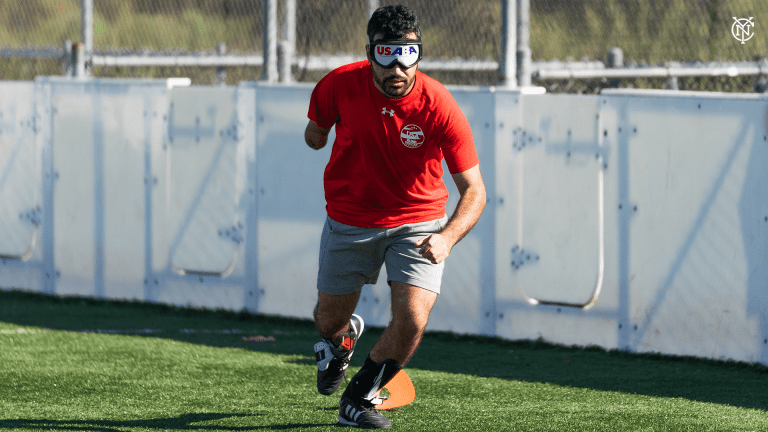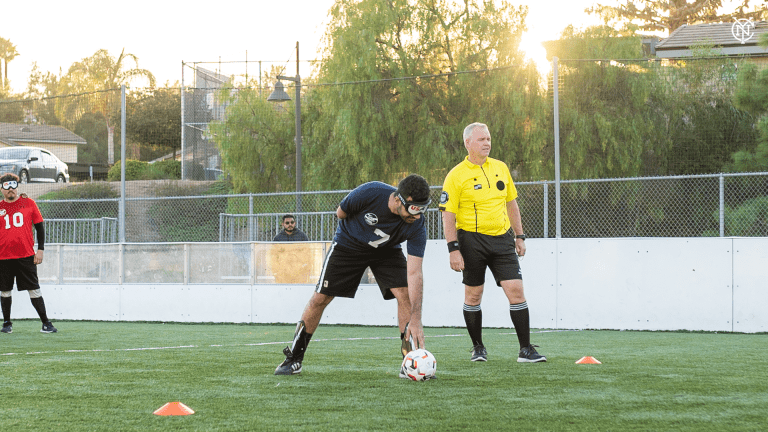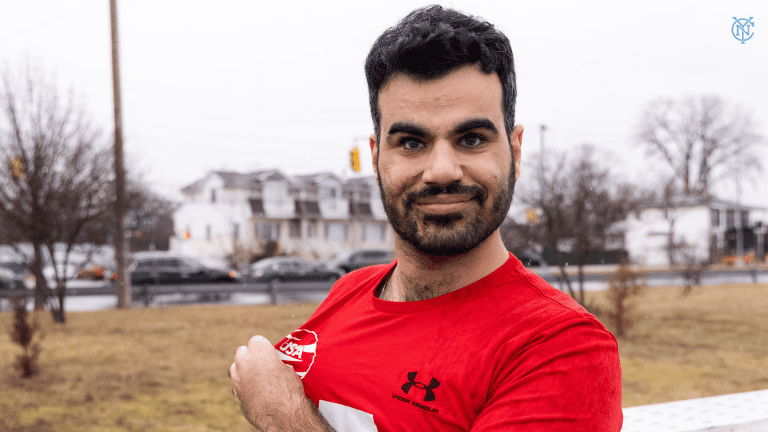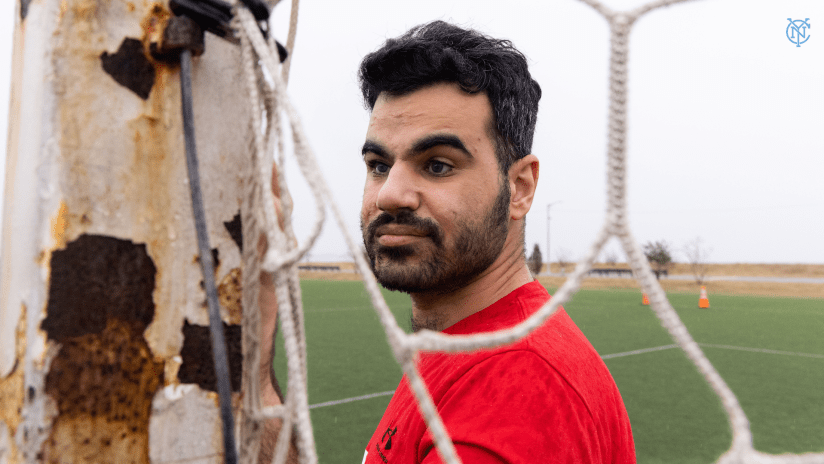Football has always been a part of Ahmed Shareef's life.
As a six-year-old, he would chase a ball around the streets of Baghdad in Iraq, emulating the heroes he would see on television. He already knew he wanted to follow in their footsteps one day. He wanted to be a professional soccer player.
“It was soccer all around me,” Ahmed recalls. “In the Middle East, there are a lot of soccer fans – or ‘football’ fans – and especially in Iraq. As kids, that's the number one thing we play.
“There's no video games, or technology, or social media or anything – and there were no sports around like basketball or tennis, or any other sport. It was soccer, number one.
“When I was growing up (five, six years old) I used to play within the school playground with my friends, in the street – sometimes without having supplies like shoes… Sometimes you played with bare feet.”
If Ahmed’s stories don’t confirm his adoration for the sport, the enthusiasm in his voice reinforces it. The sport has served not only as a passion, but also the central thread in the tapestry that is his remarkable journey.
Ahmed remembers the day he went blind. It’s impossible to forget. In one split second, childhood dreams were shattered. Serenity engulfed by chaos. Growing up in a warzone, as Ahmed did, presented many dangers. Ahmed was the victim of a bomb that took not only his innocence but also his sight and half of his arm, leaving him permanently blinded.
“I'm lucky that I'm alive,” Ahmed explained, a window into his resilient optimism. “Right away, I became disabled. I can't see totally, and I have use of one arm: my left hand.
“That dream of playing soccer for a professional team obviously died then. I was just sitting home in the dark as a seven-year-old child and there was a charity named The Global Medical Relief Fund here in Staten Island in New York City. My brother reached out through the U.S. Military about seeking help for medical reasons and a lady named Elissa Montanti runs a charity. She reached out and she said: ‘I will help this child,’ and that's how the story began.”

For Ahmed to receive help, he would have to leave so much of what he knew behind. His journey to America introduced him to a new country, a new culture, and a new language – but hope was his shield, and soccer remained his passion.
Sponsored by the charity, Ahmed traveled back and forth to Shriners Hospital in the U.S. to receive treatment for prosthetics, before making the decision as a 14-year-old to uproot his life and move to the States, showing a maturity beyond his years and a strong will to live his life to the fullest.
“I told my mother that I wanted to stay in the U.S. because I had no family, no life, no future, nothing over there. As a blind person, it’s not safe,” he explains.
That isolation of being in a foreign country without family did still remain, however. This was a time before smart phones, social media, and many of the connectivity tools we take for granted. Ahmed was also shut off from his great love – soccer -- but he would find a way.
“For the first couple of years, I didn't watch soccer, unfortunately. What I would do is: I'd get a calling card every week to say hi to my family, and ask about the teams. When there was a very important match happening, I would call my family to put the phone close to the TV so I could hear the match for an hour and a half.
“Now, the way I listen to matches is: I listen to the commentary. I follow like that. It's a story that never ends. That’s what I love about it. That's all I do at home: soccer on weekends – Premier League… I have Fantasy teams, and all this stuff.
“I started with nothing in my pocket but I had no choice. It's just: try to work, try to be independent on my own, try to never give up because that was the attitude I had.”

As time passed Ahmed began to settle into his new life in America. In High School, he learned English, uncovered a new passion – music – and became a U.S. Citizen. The building blocks of his new life began slowly slotting together.
He continued to follow soccer, and one day in 2018, fate delivered a gift that would see Ahmed back on the field, chasing the dream of being a successful player. Blind Soccer – an adapted strand of the game contested around the world with blindfolded outfield players, a rattle inside the ball, pitchside walls, and guides – is growing in popularity and now counts Ahmed among its players.
“There is something called the USABA – the US Association of Blind Athletes,” Ahmed says. “I looked at it and I signed up for the newsletter, and I got an email regarding ‘Blind Soccer’ hopping around the US. ‘Okay, what is this about?’ I reached out to the manager of the USABA and I told him my story, and I said: ‘This is what I want. This is my dream, and this is what I want to do. Can I learn about this sport?’
“I kept in touch with them and asked them to let me know about any camps or training centers. It was a brand-new project for the country. I bought my own soccer ball and started training on my own. Since I’m a musician, I have very good hearing for the sounds of the ball. I went to San Diego for three days – they sponsored me to go over there – and that’s how it started.
“What’s amazing about it: my mind is on the field – you enter a different world. For me, it was like: ‘You are dreaming again’ – when you're young, you're playing the streets of Iraq, playing soccer, you're thinking that you’re trying it out for the national team or for a team… I was like: ‘Wow, my dream was to play in a professional team. Now this might happen in a different way.’”
As part of the USA’s hosting of the 2026 World Cup and 2028 Paralympics, the country gave its backing to launch a Blind Soccer team to represent the Stars and Stripes in international competition.
Ahmed’s drive and determination allowed him to funnel his passion for soccer into a new avenue. He was learning new skills and forging new bonds.
“For blind soccer, it is completely different – you have a fold on your eyes, now you have to learn all these rules and skills with the different kind of ball... but I was open-minded, and I fell in love with it after these three days,” he adds.

“Everything is about how you learn it: by feeling and your surroundings. As a blind person, you can’t see the ball. There are certain skills with your feet that I learned from Blind Soccer that I’d never thought of, and never knew about, like the techniques – how you protect the ball, how you move around a defender.
“You create the connection between players. Blind Soccer involves a lot of communication: ‘Okay, here is the ball… Okay, I'm here, I lost the ball… Okay, I got the ball.’ We have a group chat, and we know each other, and you just create a family. Sometimes it's just the connection you build with other players – who covers you, where we need to be on the pitch – and that's pretty much what I developed: that connection with the sport especially.”
While soccer has always been a welcome distraction, now it is Ahmed’s main focus – and he now has the chance to fulfill his childhood dream. Selected in the ten-man roster for the very first USA Men’s Blind Soccer Team, he is playing a part in a historic step forward for the sport and inspiring others to follow in his footsteps, to stay positive, and to never give up.
“I tell myself: ‘Everything happened for a reason’ and I'm a person who is a dreamer,’ he concludes. “I want to achieve higher, always. Try to live your struggles and live your sad moments. Soccer helps me a lot with getting through a lot of dark, dark things but now to take it to something you're going to be playing, and starting something… I feel like a lot of generations are going to follow that, and it's going to be historic.
“Everybody in the world knows blind soccer exists in the world. People like Lionel Messi, Cristiano Ronaldo supported it – they actually played with blindfolds. It's there for everyone. I feel like a lot of generations or younger right now will grow up and might love this sport, playing in the blind team, a blind-sided team.
“I feel like I'm lucky in a way. Who started the team? It’s me and that’s not something that happens to a lot of people. I wish I could do this seven days a week – that's my hope.
“Hopefully, moving forward, we're going to have a competitive team to face other countries, and also for the local league. I want this to go forward, to get support from a lot of people, support from the organization, the club, to be recognized in the country; recognized as a team, recognized everywhere.
“Take this forward and over these years, people can go up and take this sport further.”
All at New York City Football Club wish Ahmed and the USA Blind National Team the best of luck.
For more information on Blind Soccer, visit the US Association of Blind Athletes website.



